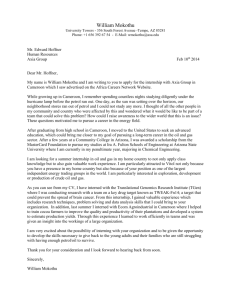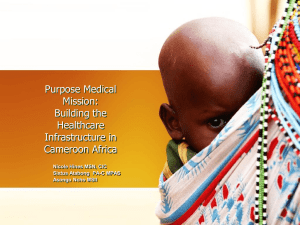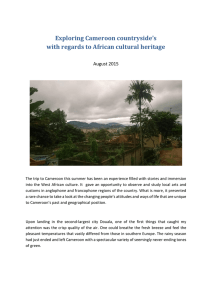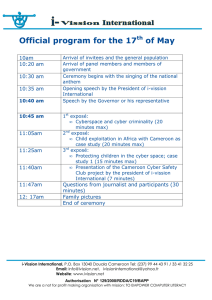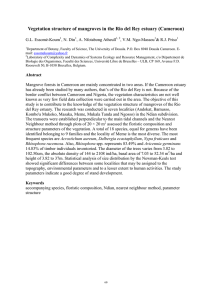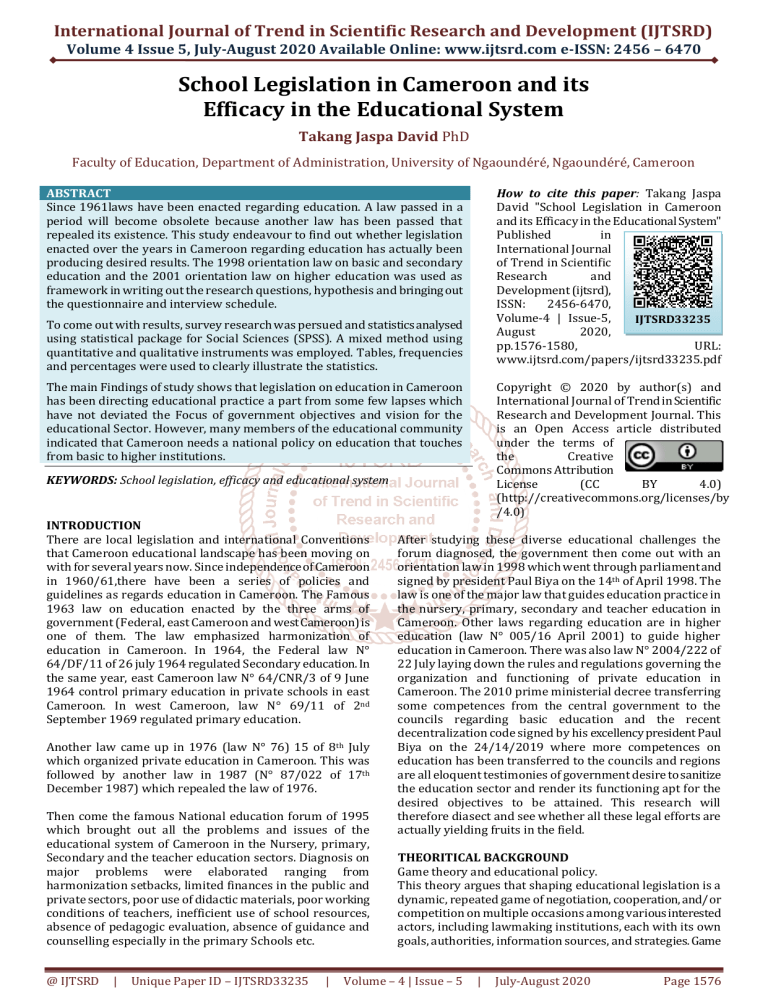
International Journal of Trend in Scientific Research and Development (IJTSRD) Volume 4 Issue 5, July-August 2020 Available Online: www.ijtsrd.com e-ISSN: 2456 – 6470 School Legislation in Cameroon and its Efficacy in the Educational System Takang Jaspa David PhD Faculty of Education, Department of Administration, University of Ngaoundéré, Ngaoundéré, Cameroon ABSTRACT Since 1961laws have been enacted regarding education. A law passed in a period will become obsolete because another law has been passed that repealed its existence. This study endeavour to find out whether legislation enacted over the years in Cameroon regarding education has actually been producing desired results. The 1998 orientation law on basic and secondary education and the 2001 orientation law on higher education was used as framework in writing out the research questions, hypothesis and bringing out the questionnaire and interview schedule. How to cite this paper: Takang Jaspa David "School Legislation in Cameroon and its Efficacy in the Educational System" Published in International Journal of Trend in Scientific Research and Development (ijtsrd), ISSN: 2456-6470, Volume-4 | Issue-5, IJTSRD33235 August 2020, pp.1576-1580, URL: www.ijtsrd.com/papers/ijtsrd33235.pdf To come out with results, survey research was persued and statistics analysed using statistical package for Social Sciences (SPSS). A mixed method using quantitative and qualitative instruments was employed. Tables, frequencies and percentages were used to clearly illustrate the statistics. The main Findings of study shows that legislation on education in Cameroon has been directing educational practice a part from some few lapses which have not deviated the Focus of government objectives and vision for the educational Sector. However, many members of the educational community indicated that Cameroon needs a national policy on education that touches from basic to higher institutions. Copyright © 2020 by author(s) and International Journal of Trend in Scientific Research and Development Journal. This is an Open Access article distributed under the terms of the Creative Commons Attribution License (CC BY 4.0) (http://creativecommons.org/licenses/by /4.0) KEYWORDS: School legislation, efficacy and educational system INTRODUCTION There are local legislation and international Conventions that Cameroon educational landscape has been moving on with for several years now. Since independence of Cameroon in 1960/61,there have been a series of policies and guidelines as regards education in Cameroon. The Famous 1963 law on education enacted by the three arms of government (Federal, east Cameroon and west Cameroon) is one of them. The law emphasized harmonization of education in Cameroon. In 1964, the Federal law N° 64/DF/11 of 26 july 1964 regulated Secondary education. In the same year, east Cameroon law N° 64/CNR/3 of 9 June 1964 control primary education in private schools in east Cameroon. In west Cameroon, law N° 69/11 of 2nd September 1969 regulated primary education. Another law came up in 1976 (law N° 76) 15 of 8 th July which organized private education in Cameroon. This was followed by another law in 1987 (N° 87/022 of 17th December 1987) which repealed the law of 1976. Then come the famous National education forum of 1995 which brought out all the problems and issues of the educational system of Cameroon in the Nursery, primary, Secondary and the teacher education sectors. Diagnosis on major problems were elaborated ranging from harmonization setbacks, limited finances in the public and private sectors, poor use of didactic materials, poor working conditions of teachers, inefficient use of school resources, absence of pedagogic evaluation, absence of guidance and counselling especially in the primary Schools etc. @ IJTSRD | Unique Paper ID – IJTSRD33235 | After studying these diverse educational challenges the forum diagnosed, the government then come out with an orientation law in 1998 which went through parliament and signed by president Paul Biya on the 14th of April 1998. The law is one of the major law that guides education practice in the nursery, primary, secondary and teacher education in Cameroon. Other laws regarding education are in higher education (law N° 005/16 April 2001) to guide higher education in Cameroon. There was also law N° 2004/222 of 22 July laying down the rules and regulations governing the organization and functioning of private education in Cameroon. The 2010 prime ministerial decree transferring some competences from the central government to the councils regarding basic education and the recent decentralization code signed by his excellency president Paul Biya on the 24/14/2019 where more competences on education has been transferred to the councils and regions are all eloquent testimonies of government desire to sanitize the education sector and render its functioning apt for the desired objectives to be attained. This research will therefore diasect and see whether all these legal efforts are actually yielding fruits in the field. THEORITICAL BACKGROUND Game theory and educational policy. This theory argues that shaping educational legislation is a dynamic, repeated game of negotiation, cooperation, and/ or competition on multiple occasions among various interested actors, including lawmaking institutions, each with its own goals, authorities, information sources, and strategies. Game Volume – 4 | Issue – 5 | July-August 2020 Page 1576 International Journal of Trend in Scientific Research and Development (IJTSRD) @ www.ijtsrd.com eISSN: 2456-6470 theory was founded by John Von Neumann (1903- 1957) and Oskar Morgenstein (1902-1977). Their theory (game theory) centred on strategic behavior of decision makers who are aware that their decisions affect one another. The game theory are put forth applies to the Cameroon educational system as it portrays repeated legislation from one period of time to the other from interested actors (government, lawmakers) have goals to achieved. session of the United Nations general conference on education as an integral part of the basic general education of each nation. In 2001 (May 21-26) in Beijing China another international conference of experts in general secondary education in the 21st century was organized by UNESCO. The conference proposed ways for the restructuring of general secondary education in order to enable it improve its quality and importance. LITERATURE REVIEW In Cameroon educational system there are a series of laws since 1963. The famous 1963 law on education enacted by the three arms of government (Federal, East Cameroon and west Cameroon) is one of them. The law emphasized harmonization of education in Cameroon. In 1964 the Federal law N° 64/DF/11 of 26 July 1964 regulated secondary education. In the same year, east Cameroon law N° 64/CNR/3 of 9 June 1964 control primary education in private schools in east Cameroon. In West Cameroon, law N° 69/11 of 2ndSeptember 1969 regulated primary education. The international declaration on higher education and the priority action framework for changing and developing higher education in Paris (1998) was another convention. The conference recommended a widening of access to higher education base on merit, the renovation of the strengthening of relations with the society especially to the job market. Another law came up in 1976 (law N° 76/15 of 8 July 1976) which organized private education in Cameroon. This was followed by another law in 1987 (N° 87/022 of 17 December 1987) which repealed the law of 1976. After the 1995 forum on education which organized many challenges of the educational system, the 1998 orientation law on education regarding basic, secondary and teacher training was enacted. In 2001, another orientation law was enacted but specifically for Higher education in Cameroon. It is worth noting that the highest law of Cameroon, the constitution stipulated that the State shall guarantee the child’s right to education. That primary education shall be the bounden duty of the State. private education was also guided by law N° 2004/022 of July 2004 repealling the 1987 law. It emphasise the organization and functioning of private education in Cameroon. The 2010 prime ministerial order transferring some competences from central government to the councils in the domain of basic education was another landmark legislation in education in Cameroon. The recent decentralization code promulgated into law on the 24/12/2019 where central government has transferred some powers to the regions in domain of education is also another legislation that is to impact all stakeholders in the educational community. INTERNATIONAL CONVENTIONS IN EDUCATION ENDORSED BY CAMEROON There are some international conventions Cameroon has ratified in the domain of education. The first is international declaration of education for all (that held in Jomtien, Thailand 5-9 March 1990) which agreed on the Universalization of basic education and the reduction of illitracy before the end of the 1990’S. Second is the Dakar action framework for education for all adopted during the world forum on education (Dakar, Senegal 2000) which reaffirmed the commitment of members, including Cameroon to realize the objectives of education for all by 2015. Another convention was the revised convention on technical and vocational education adopted in 2001 during the 31st @ IJTSRD | Unique Paper ID – IJTSRD33235 | Another important International Convention on education ratified by Cameroon was the Universal declaration of human rights and African Charter on human and people’s rights. Regarding the Universal declaration of human rights, article 26(1) recognize that everyone has right to education. That education shall be free at least in the elementary and fundamental Stages. The African Charter on human and people’s rights adopted in Nairobi; Kenya in June 27 1981 (article 17) explains that every individual shall have the right to education. RESEARCH METHODOLOGY Convenience and purposive sampling techniques were used to collect data for the study. In the South west region precisely Buea and Limbe subdivision, 10 public and private secondary schools were selected and in the North region precisely in the Benoue division 10 public and private secondary schools were also selected. In each school one principal, one vice-principal and five teachers were selected to answer the likert scale questions in the questionnaire. To complement the quantitative approach was the qualitative approach that corroborate the findings obtained using the questionnaire. In this regard, interview schedule was used to get information regarding the efficacy of the legislation on education in Cameroon. Two divisional delegate for secondary education in the south west and two divisional delegate for the North region were purposely selected to respond to the interview schedule. Also, two heads of departments from the University of Buea were purposely selected to respond to the schedule. The questionnaire constituted a brief introduction and five statements concerning 1998 orientation law on education and five statements concerning the 2001 orientation law on higher education. Respondents were to answer Yes or Noin each of the ten statements. Out of the 140 questionnaires produced 6 were not returned meaning only 134 were returned and valid giving a response rate of95.71 %. The questionnaire and interview schedule were pilot tested in 2 public schools in Buea subdivision. The principal and Vice-principal in each of the school peer review the questionnaire and interview schedule for clarity and relevance to the research questions and hypothesis. Many adjustments were effected on the instruments due to their recommendations. Volume – 4 | Issue – 5 | July-August 2020 Page 1577 International Journal of Trend in Scientific Research and Development (IJTSRD) @ www.ijtsrd.com eISSN: 2456-6470 RESEARCH QUESTIONS The research question of this study was: 1. What percentage of success have the 1998 and 2001 laws on education achieved in fostering government objectives in education? The subsidiary research question was: 2. What can be done to make education legislation in Cameroon more vibrant and purposeful? PURPOSE OF THE STUDY This study is to ascertain whether legislation on education has been impacting on the pupils and students as desired by government. SIGNIFICANCE OF STUDY This study seeks to create awareness of the need for regular monitoring of the laws that guide educational provision in Cameroon. Education laws is the watch dog in the educational system and must be evaluated to see its efficacy in the field especially as government spends huge resources in providing education to its citizens. HYPOTHESIS OF THE STUDY General hypothesis School legislation in Cameroon enacted in 1998 regarding basic and secondary education and 2001 regarding higher education have greatly contributed in achieving government objectives in education. Specific hypothesis 1. Due to the 1998 law on education regarding basic and secondary education government objectives in education have been achieved 2. Due to the 2001 law on education regarding higher education government objectives in higher education have been achieved. Results and discussions Table 1: Findings from the questionnaire relating to hypothesis 1 that says due to the 1998 law on education regarding Basic and secondary education government objectives in education have been achieved. Responses Statement Yes No F % F % The 1998 law has made students to cultivate the love of effort and quest for excellence 97 88.9 12 11.0 The 1998 law has made it possible for students to inculcate Moral values 31 28.4 78 71.5 The 1998 law has made students to inculcate civic values in the society. 83 76.14 26 23.85 The 1998 law has made students to inculcate intellectual values 101 92.6 08 7.3 The 1998 law has made it possible for students to be integrated into society after 90 82.5 19 17.4 graduation from school Out of all the statements in this part of the questionnaire, only the statement on the 1998 law regarding making it possible for students to inculcate moral values registered a Negative response with 71.5%. regarding the 1998 law encouraging students to cultivate the love for effort and quest for excellence respondents were positive with an over whelming yes response rate of 88.9%. 76.14% was recorded as respondents agreed that the 1998 law has made students incalculate civic values in the society. Regarding the 1998 law regarding students to inculcate intellectual values and making it possible for students to be integrated into society after graduation from school, 92.6% Yes and 82.5% Yes were respectively registered. Table 2: Findings from questionnaire relating to hypothesis 2 that says due to 2001 law on education regarding higher education government objectives in higher education have been achieved. Responses Statement Yes No F % F % The 2001 law has made the quest for excellence in all domains of knowledge possible 88 80.7 21 19.26 The 2001 law has assisted developmental activities in the community 87 79.8 22 20.1 The 2001 law has lead to the training and further training of senior staff 91 83.4 18 16.5 The 2001 law has lead to the promotion of democracy and the development of democratic 89 81.6 20 18.3 culture The 2001 law has lead to the promotion of bilingualism in Cameroon 89 81.6 20 18.3 In this section of the 2001 law on higher education respondents were all positive in their responses. 80.7%, 79.8%, 83.4%, 81.6% and 81.6% Yes were registered in all the statement. HYPOTHESIS TESTING Hypothesis 1: Due to the 1998 law on education regarding basic and secondary education government objectives in education have been achieved. Null hypothesis: Due to the 1998 law on education regarding basic and secondary education government objectives in education have been achieved. @ IJTSRD | Unique Paper ID – IJTSRD33235 | Alternative Hypothesis: Due to the 1998 law on education regarding basic and secondary education government objectives have not been achieved. The responses obtained reveal high percentages of Yes responses that due to the 1998 lawon education government objectives have been achieved thereby up holding the null hypothesis. Volume – 4 | Issue – 5 | July-August 2020 Page 1578 International Journal of Trend in Scientific Research and Development (IJTSRD) @ www.ijtsrd.com eISSN: 2456-6470 Hypothesis 2: Due to the 2001 law on education regarding higher education government objectives as concerns higher education have been achieved. Null hypothesis: Due to the 2001 law on education regarding higher education government objectives as concerns higher education have been achieved. Alternative Hypothesis: Due to the 2001 law on Education regarding higher education government objectives as concerns higher education have not been achieved. The responses obtained reveal high percentages of yes responses that due to 2001 law on education government objectives have been achieved thereby upholding the null hypothesis. Interview schedule responses from divisional Delegates for secondary education in the South West and North region of Cameroon and the heads of departments from the University of Buea. The statement in the interview schedule was “how do you perceive the legislation on education in 1998 regarding basic and secondary education and the 2001 law on higher education in Cameroon”? what ways or measures can be used to make the laws more apt and purposeful in guiding educational activities in Cameroon? Response: In response to the above, all the divisional delegates were very positive saying that the laws of 1998 on basic and secondary education have contributed a lot in forstering education practiced. However, some of the articles were criticised. For example, the article relating to removal of corporal punishment in schools. The two divisional delegates from the North and from the South West condemned the legislation saying the children and students are now going astray due to this law. The divisional delegate for Meme explained that the recent cases of students recalcitrant outings is due to this unfore seen reaction of protecting students and pupils. One of them quoted the popular saying that: “Spare the rod and spoil the child”. One of the divisional delegate supported the law saying that children must be protected from overzealous teachers who over react with the use of whip instead of using their pedagogic skills to correct the child. He explained that there are certain mistakes children make which needs basic counselling from the teacher other than using the cane. The divisional delegate for Benoue carefully explained that the article on the creation of a national structure to control education which has not been effected is a set back to the educational system at the basic and secondary level. Regarding higher education, the heads of departments interviewed said the 2001 orientation law gave much flesh to higher education practice in Cameroon. They all said the law was well drafted as it covered all stakeholders including the private Sector. In the domain of what can be done to make the legislation more apt and purposeful, the delegates and heads of department proposed a national policy guidelines or policy @ IJTSRD | Unique Paper ID – IJTSRD33235 | on education. The head of department for Geography brought clear examples for Nigeria and India having National Policy on education starting from pre-nursery to higher education. He explained that the situation of Cameroon is disorderly in presentation as a law can be used to make another excellent law useless. He explained that the 1998 law and 2001 law on higher education need to be combined to come out with a national legislation on education. Discussion of findings Clearly, the respondents find the laws apt in alding government achieve their objectives in spending huge resources in the provision of education in Cameroon. All countries of the world have legislation on education and was through a series of consultations and symposium organized to put in place concrete guidelines on the envisaged objectives to be achieved. It is worth mentioning that many countries have national policy on education that gives the general orientation and the philosophy of the education system like the case of India (1986) and that of Nigeria. Generally speaking, a national policy document on education globally brings out the direction educational practices should follow from basic to higher education. If we look at the case of Nigeria (since 1976) it has twelve (12) sections starting from the philosophy of Nigeria education to financing of education as follows: Section 1: Philosophy of Nigerian education Section 2: Pre-primary education Section 3: Primary education Section 4: Secondary education Section 5: Higher education including professional education Section 6: Technical education Section 7: Adult education and non-formal education Section 8: Special education Section 9: Teacher education Section 10: Educational services Section 11: Administration and planning of education Section 12: Financing of education It is clear from this National guide that it provides visibility in orientating any stakeholder who is in search of any policy on education. Hopefully, the educational authorities in Cameroon can learn from this National approach in orienting the educational system. CONCLUSLONS In conclusion, Cameroon educational system over the years have been controlled with many laws. Some of the laws become obselete bacause of new challenges that emerge espercially as the curriculum keep changing as a dynamic instrument in any educational system. All that is needed by the education policy makers, planners and government machinery is a coherent national education policy that gives clear national orientation on education. RECOMMENDATIONS 1. Government should synergize the 1998, 2001lawsand any other laws on education in Cameroon. 2. The 1998 law should be reviewed and suppress the “article” on “nocorporal punishment in schools” so as to re-direct corporal punishment to better pedagogic approaches in correcting students and pupils. 3. The national policy on education document should be put at the disposal of all stakeholders especially Volume – 4 | Issue – 5 | July-August 2020 Page 1579 International Journal of Trend in Scientific Research and Development (IJTSRD) @ www.ijtsrd.com eISSN: 2456-6470 4. teachers, administrators and parents for their constant consultation. [4] Ateyo, A. (2000).Cameroon education system. Buea: Loving world publishing house Government should endeavor to make sure all elements found in the policy should be implemented. [5] National policy on education, Nigeria (1976) [6] 2004 law on private education in Cameroon REFERENCES [1] 1998 orientation law on education (14th April 1998). [7] 2010 prime ministerial decree divulging state peners to councils in Cameroon (2010) [2] 2001 orientation law on higher education [8] 2019 decentralization code of Cameroon [3] Amin, W.E (2005).Social Science research: Conception, methodology and analysis. Kampala: Makerere University printer. [9] 1996 Constitution of Cameroon [10] Universal declaration of human rights [11] African Charter of human and peoples rights @ IJTSRD | Unique Paper ID – IJTSRD33235 | Volume – 4 | Issue – 5 | July-August 2020 Page 1580
